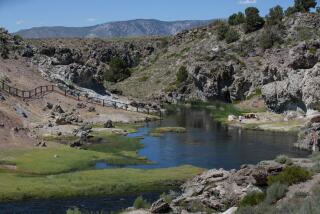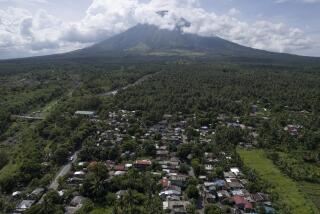Volcano May Upset U.S. Offers on Bases : Philippines: Washington wants to see how much damage the eruption is causing before signing an agreement.
- Share via
WASHINGTON — Damage from the Mt. Pinatubo volcano in the Philippines could cause the Bush Administration to reduce or pull back its offers for the continued use of the strategic American military bases in the Philippines, Administration officials said Thursday.
“If Clark Air Base is unuseful to us, they (Philippine officials) will pay the price for their decision (to balk at recent American offers),” said one senior Administration official who has closely followed the yearlong negotiations over the future of the bases.
At the moment, he said, the United States would not sign a new agreement even if the government of President Corazon Aquino suddenly accepted in full the most recent American offer for the bases, the mainstay of American military power in Southeast Asia.
Rather, this official said, the United States wants to wait, at least briefly, to see how much damage the volcano will cause to Clark and the Subic Bay Naval Base. The eruption “could, in the extreme, render (Clark Air Base) inoperative for jet aircraft,” the Administration official said.
“It devalues the property substantially if it is covered with sulfuric ash,” asserted another Administration source, a senior State Department official. The U.S. officials spoke on condition that they would not be identified.
This spring, after a year of negotiations, the Bush Administration and Philippine officials had been moving toward an agreement that would permit continued U.S. use of Clark and Subic Bay for at least seven years. The current leases expire Sept. 16.
However, at the end of the last round of talks in May, the two sides remained deadlocked over several issues, particularly over exactly how long the Americans might be allowed to stay and how much the United States will pay. This week, the United States evacuated about 15,000 Americans from Clark Air Base in advance of the volcanic eruption, which covered parts of the base with ash.
Of the two bases, Subic Bay is considered much more important than Clark. With new, longer-range aircraft, the United States can send planes into or through Southeast Asia from more distant locations in Guam, Japan or elsewhere. The naval base, which is used for servicing and repairing ships traveling across the Pacific and Indian Oceans, is more difficult to replace.
In an interview Thursday, Emmanuel Pelaez, the Philippine ambassador to the United States, termed the volcanic eruption “an act of God” and said he did not think it should affect the base negotiations. But he added, “Of course, any agreement must be mutual. Before the last ‘i’ is dotted and the last ‘t’ is crossed, either side can change its stand.”
He also acknowledged that “the utility of Clark field will remain at issue until this (volcano) dies down, and that could take several years.”
Officials in Washington said that Richard L. Armitage, the former Defense Department official assigned by President Bush to take charge of the base negotiations, has been keeping in close touch with Nicholas Platt, the U.S. ambassador in Manila, to try to gauge the impact of the volcano on the bases.
“The (volcanic) cloud is not yet drifting over Clark,” an Administration official said Thursday. He said U.S. officials are worried that a typhoon or heavy rains could move into the area, increasing the flow of volcanic ash and also possibly causing mudslides.
During the acrimonious negotiations, U.S. officials sometimes complained that the Philippine government was treating Clark and Subic Bay as if they were merely pieces of commercial real estate up for sale.
On Thursday, one senior U.S. official said the Philippine approach might now come back to haunt the country. “If the United States is not able to make use of Clark, since it’s being viewed as a piece of real estate, then clearly the value of the real estate goes down,” he asserted.
Pelaez noted that even if the volcano eruption does not directly affect the base negotiations, it could still have other serious effects on the Philippine economy.
Under the proposed base agreement, the ambassador said, one of Clark’s two runways would be released to the Philippines for commercial use.
In the Philippines on Thursday, Mt. Pinatubo blew a cloud of ash and pumice 80,000 feet in the air, coating villages and mountainsides with a thick carpet of the snow-like debris.
The early-morning explosion, which lasted half an hour, was among the strongest of seven eruptions that have shaken the 4,795-foot volcano since Wednesday. Ash three inches deep covered areas as far away as Olongapo, 25 miles to the southwest. Vehicles stalled under a deluge of ash.
Associated Press reporter Claro Cortes, who was 10 miles west of the crater when the eruption occurred, said residents fled in panic, some clutching chickens and holding handkerchiefs over their faces. About 40 reporters and photographers ran for their cars, taking as many residents as they could.
Looters took advantage of the confusion to ransack offices of the U.S. military’s Crow Valley aerial gunnery range, according to the governor of Tarlac province, Mariano Un Ocampo.
Crow Valley is on the northwestern end of Clark Air Base, about 10 miles east of Mt. Pinatubo. On Thursday, a Philippine television network, IBC, broadcast film showing doors to buildings at the range containing ammunition and equipment forced open, with interiors ransacked.
More to Read
Sign up for Essential California
The most important California stories and recommendations in your inbox every morning.
You may occasionally receive promotional content from the Los Angeles Times.













